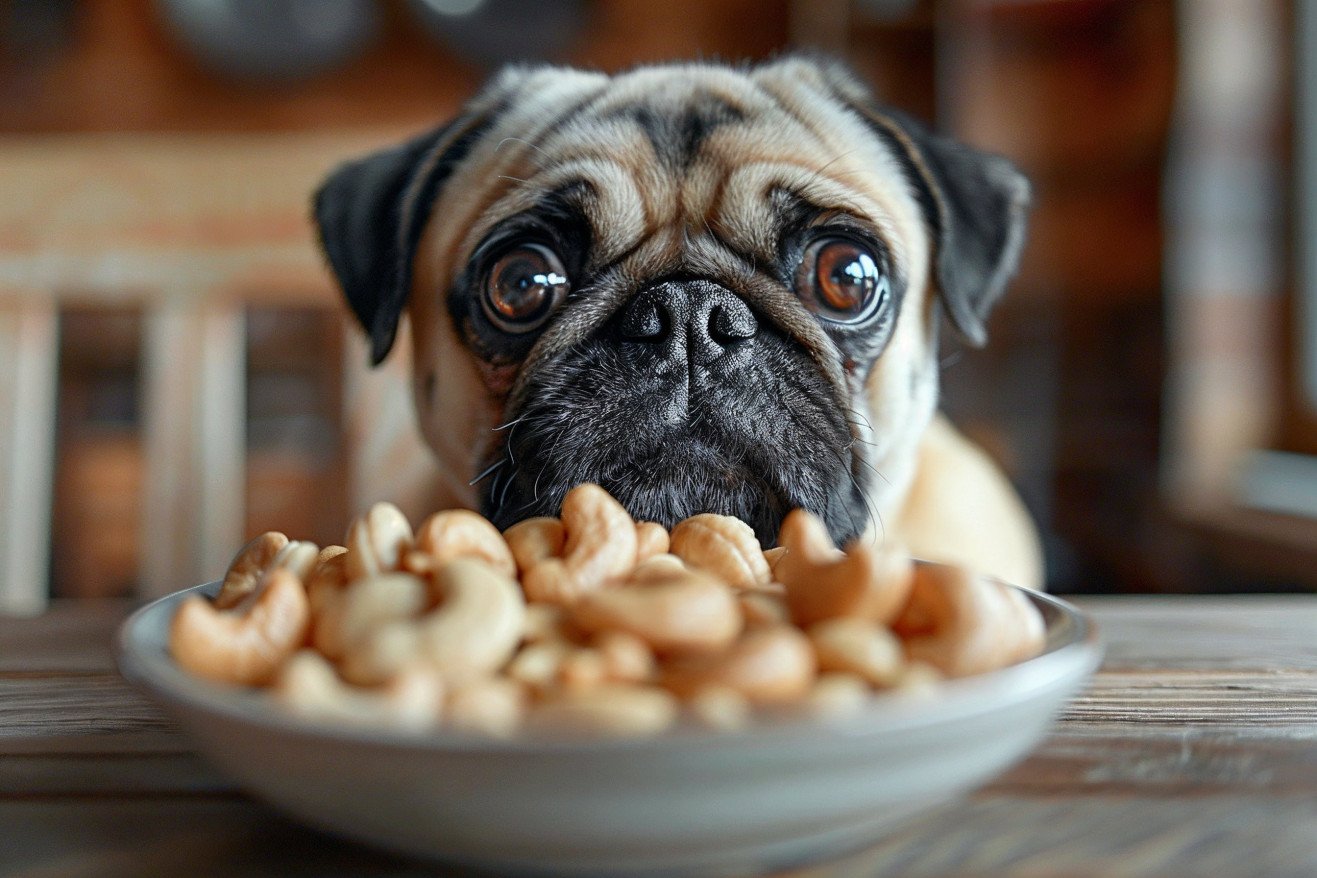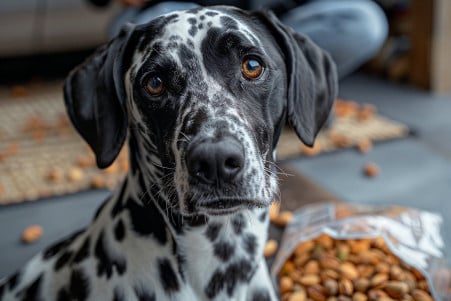Can Dogs Eat Cashews? Exploring the Pros and Cons
25 May 2024 • Updated 25 May 2024

Although cashews can provide some nutritional value to dogs, it's important to know the potential drawbacks and the right portion sizes before you give your dog these popular nuts. Cashews are fatty and can lead to pancreatitis and obesity if they're overconsumed, so they should be used as an occasional treat in moderation, and they should be free of added salt and other flavorings.
To help you better understand the potential effects of dogs eating cashews, we'll look at studies by veterinary nutritionists and animal dieticians that detail the nutrients in cashews and how they're processed by a dog's digestive system. Through case reports, portion recommendations, and input from experts, you'll leave with a clear picture of whether cashews can be a healthy snack for your dog and how you can make sure they're eating them in a way that's safe.
Can dogs eat cashews?
Nutritional Value: What Do Cashews Have to Offer Dogs?
Cashews are a nutritional powerhouse for our furry friends, supplying a variety of vitamins, minerals, and healthy fats. As mentioned by Pawlicy Advisor, cashews are rich in omega-6 fatty acids, which can help reduce inflammation and support skin and coat health. They're also packed with antioxidants, fiber, protein, vitamin K, flavanols, calcium, copper, magnesium, iron, manganese, phosphorus, and zinc.
That said, the fat content in cashews can be a bit of a catch-22. Although cashews are full of healthy monounsaturated and polyunsaturated fats, per Pumpkin Pet Insurance, their fat content means they should be fed in moderation to prevent weight gain, pancreatitis, and other potential issues. While the fiber in cashews can support gut health, the calorie content of these nuts may cancel out any digestive benefits for some dogs.
According to veterinarian Dr. Ochoa in an interview with The Dodo, cashews are OK for dogs to eat as an occasional snack, but they shouldn’t be a regular part of their diet. Their fat content can lead to gastrointestinal upset, such as vomiting and diarrhea, if they’re consumed in large amounts. In some cases, the potential downsides of cashews may be more likely than the potential benefits, so you should talk to your vet before giving them to your dog.
Portion Control: How Many Cashews Can Dogs Eat?
The amount of cashews that dogs can eat depends on the size and weight of the dog. According to Pumpkin Pet Insurance, small dogs can eat 1-2 cashews a day, while larger dogs can eat a small handful or 3-5 cashews. However, as mentioned by Dogster, cashews can cause weight gain, pancreatitis, and other gastrointestinal problems if they are overfed to dogs, so it's important to make sure that you are feeding your dog the right amount.
Veterinarians advise that you talk to them to get a better idea of how many cashews your dog can eat based on their size and breed. In addition, as pointed out by Rover.com, it's important to make sure that you watch your dog after you feed them cashews and adjust the amount you feed them based on their reaction to the nuts.
While cashews can be a delicious treat for dogs, it's important to make sure that you feed them to your dog in moderation to avoid any potential health problems. In the next section, we'll take a look at the safety of cashew-based products, such as butter and milk.
Cashew Butter and Milk: Healthy Options or Toxic Hazards?
While cashew butter can be a healthy snack for dogs in small amounts, it should be used with caution because of the potential dangers. As pointed out by Ayoub's Dried Fruits & Nuts, cashew butter is full of good fats, protein, and important minerals, which can make it a good source of nutrition for dogs. However, because of the high fat content, it should be fed in moderation to avoid stomach upset and weight gain.
Unsweetened, unsalted cashew butter is the best option, as Rau Animal Hospital explains that the sugars and salt in sweetened and salted versions can be dangerous for dogs. In the same way, Petful explains that while cashew milk is OK for dogs, it should be unsweetened and fed in moderation because the calories can add up for your dog.
Both cashew butter and milk should be used to supplement a dog's regular diet, not as a way to get important nutrients. As with any new food, it's important to monitor for signs of allergies or stomach upset when you first introduce these cashew-based products into your dog's diet.
Potential Risks and Side Effects: What to Look Out For
There are several potential health risks associated with dogs eating cashews, including pancreatitis, obesity, and gastrointestinal issues. According to Walkee Paws, cashew shells contain urushiol, a toxic substance that can be dangerous for dogs if ingested.
Symptoms of a problem can include lethargy, abdominal pain, vomiting, and diarrhea, all of which should be addressed by a veterinarian immediately, says Greg.app. Cashews can also cause allergic reactions in some dogs, leading to symptoms like swelling, hives, or itching.
The high fat and salt content in cashews can lead to bladder stones or salt toxicity if consumed in large amounts, according to Spot Pet. It’s important to pay attention to your dog’s response and adjust portion sizes as needed when you give them cashews.
Conclusion: Cashews Should Be Given in Moderation
While cashews can offer some nutritional benefits for dogs, they should be given as an occasional treat rather than a regular part of their diet. Unsalted, roasted cashews in moderation are the safest option, with portion sizes determined by a dog's size and weight. Cashew-based products like butter and milk can be given in small amounts, but owners should be watchful for any signs of an adverse reaction.
It's important to monitor your dog's reaction after introducing cashews and adjust serving sizes or discontinue if any health issues arise. For personalized guidance on safely incorporating cashews into your dog's diet, talk to your vet.


